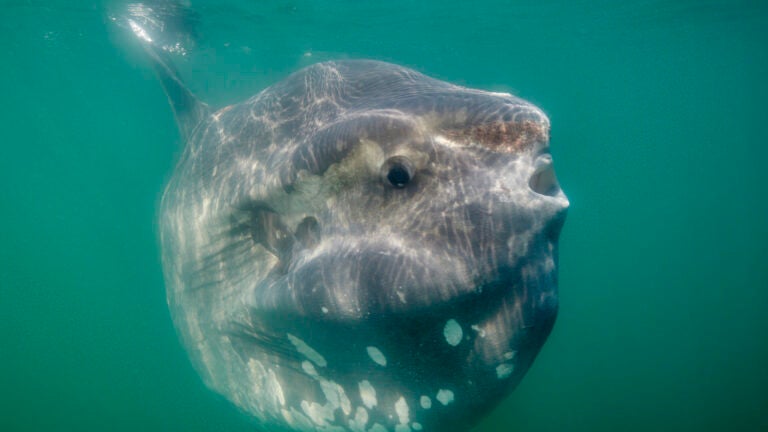Newsletter Signup
Stay up to date on all the latest news from Boston.com

Those headed to Massachusetts beaches this summer know to keep an eye out for sharks, especially great whites. The creatures inspire both fear and excitement, and people are often eager to see them in person. But even if one spots an ominous-looking fin jutting up from the water, it doesn’t necessarily mean a great white is on the hunt.
In fact, a few remarkable creatures in their own right are often mistaken for great whites. And those cases of mistaken identity appear to be on the rise in recent weeks, according to John Chisholm, a prominent shark researcher with the New England Aquarium.
Chisholm is the man responsible for confirming shark sightings that members of the public report through the Atlantic White Shark Conservancy’s Sharktivity App.
“I’ve been disappointing a lot of people this week by telling them they saw sunfish and a couple of basking sharks, because everybody wants to see a white shark. I like to help people be able to draw those conclusions on their own,” he said.
Ocean sunfish, or mola mola (or “baby wheels“), do not look anything like great whites under the surface. Almost comically large and flat, they are the heaviest bony fish in the world. But above the surface, and especially from afar, their dorsal fins could be mistaken for those of a shark.
“In the past week, the majority of the sightings I’ve received have been ocean sunfish, mainly because of that big dorsal fin,” Chisholm said.
Sunfish, true to their name, love spending time basking in the sun near the surface of the water. They are commonly found in Massachusetts waters during the warm summer months, and are not afraid to get close to shore, Chisholm said.
Once one knows what to look for, it is very easy to spot the difference between a white shark and a sunfish. To swim, the latter waves its dorsal and ventral fins back and forth, paddling through the water. Viewed from above the surface its dorsal fin can be seen moving up and down, in and out of the water. When someone is reporting a shark sighting to Chisolm and mentions a fin moving like that, he immediately knows it is no apex predator, he said.
The dorsal fins of sunfish are taller and narrower than those of a white shark, he added. They are not considered dangerous to humans, as they have small mouths and feed on jellyfish. They can be curious, and may approach humans and boats, but would not pose a threat.
While sunfish sightings have been common recently, false white shark sightings are more often than not attributed to basking sharks, Chisholm said. Basking sharks have a similar shape to great whites, and their dorsal fins remain relatively stable compared to sunfish.
The key with identifying basking sharks is, ideally, to get close and look for large gills that almost wrap around their heads, Chisholm said. Their dorsal fins are also round, compared to the pointed fins of a great white.
Basking sharks are filter feeders, so they won’t try to bite any humans. However, their skin is extremely rough, and making contact with one can cut up a human’s skin in a dangerous way.
Sunfish and basking sharks are not the only thing that members of the public confuse with white sharks. Chisholm said more and more people are seeing seals sleeping or resting near the surface and thinking that their heads are shark fins. Seals can float in the water with only their heads exposed, an activity called bottling. This has been seen a lot near Manomet Point in Plymouth recently.
A friendly reminder, not all ‘fins’ are what they appear to be. The head of a gray seal resting on the surface can resemble the profile of a dorsal fin. This has resulted in a growing number of mistaken identity reports. pic.twitter.com/RTSPuX0LS4
— MA Sharks 🦈 (@MA_Sharks) July 18, 2023
“A growing number of reports are turning out to be seals, but by far the most mistaken is the basking shark, close behind that is the ocean sunfish, and then seal heads would probably be third place,” Chisholm said.
Although scientists like Chisholm are hoping to inform beachgoers about the differences between these creatures, it is always better to be safe than sorry.
“If anybody sees a fin or what they think is a fin in the water, get out of the water. Always err on the side of caution. Let the authorities know and let it be investigated,” Chisholm said.
Stay up to date on all the latest news from Boston.com
Stay up to date with everything Boston. Receive the latest news and breaking updates, straight from our newsroom to your inbox.
Conversation
This discussion has ended. Please join elsewhere on Boston.com